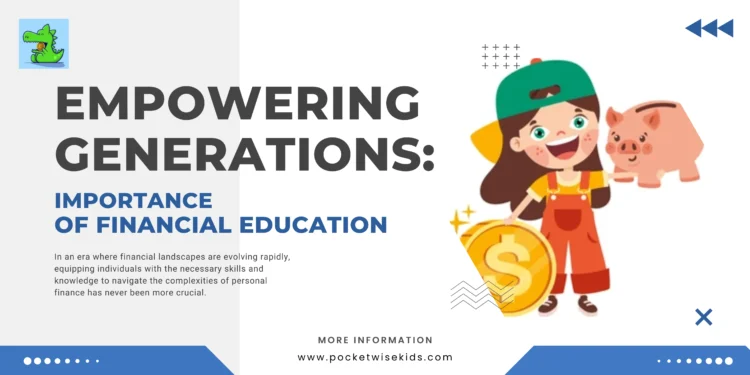Introduction
In an era where financial landscapes are evolving rapidly, equipping individuals with the necessary skills and knowledge to navigate the complexities of personal finance has never been more crucial. Financial education is the key to empowering generations and fostering economic well-being. This article explores the significance of financial education and how tailoring it to different age groups can enhance its impact.
Understanding Financial Education
Financial education goes beyond the basics of budgeting and saving. It encompasses a comprehensive understanding of financial concepts such as investments, debt management, retirement planning, and the ability to make informed decisions about money. By imparting financial education, individuals are better prepared to face the challenges and opportunities that arise throughout their lives.
Financial Education to Different Age Groups
- Children and Teens: Building a Foundation
Financial education should commence early in life, ideally during childhood. Teaching children about money management, the value of saving, and the consequences of spending impulsively lays a solid foundation. As they enter their teenage years, concepts like budgeting, understanding credit, and the importance of delayed gratification can be introduced. Interactive and age-appropriate resources, such as games and simulations, can make the learning process engaging for younger age groups. - Young Adults: Navigating Independence
As individuals transition into adulthood, they face a myriad of financial decisions, from student loans and renting an apartment to establishing credit and saving for major life events. Tailoring financial education to young adults involves addressing topics such as student loans, building credit responsibly, understanding the implications of different financial products, and creating a roadmap for achieving short and long-term financial goals.
- Middle-Aged Individuals: Balancing Responsibilities
The middle years often bring increased financial responsibilities, such as homeownership, raising a family, and saving for children’s education. Financial education for this age group may focus on advanced topics like investing, tax planning, and comprehensive retirement strategies. Strategies for managing debt and protecting assets through insurance products become particularly relevant.
- Seniors: Navigating Retirement
For seniors, financial education takes on a different emphasis. Understanding retirement options, maximizing Social Security benefits, estate planning, and navigating healthcare costs are crucial components. Ensuring financial security during retirement requires a thoughtful approach, and providing resources tailored to this age group can empower individuals to make informed decisions for their golden years.
Benefits of Financial Education
- Empowerment and Confidence:
Financial education instills confidence in individuals to make sound financial decisions, empowering them to take control of their financial futures.
- Reduced Financial Stress
Equipped with the knowledge to manage money effectively, individuals are better positioned to reduce financial stress and improve overall well-being.
- Economic Stability
A financially literate population contributes to economic stability by fostering responsible financial behavior and reducing the likelihood of financial crises.
- Long-Term Wealth Accumulation
Through informed decision-making, individuals can optimize their financial resources, leading to long-term wealth accumulation and financial security.
Conclusion
Financial education is a powerful tool for empowering generations to achieve economic success and stability. Tailoring Financial Education to Different Age Groups ensures that individuals receive the knowledge and skills relevant to their life stage. By investing in financial education, societies can pave the way for a financially literate and resilient future.
Pocket Wise Kids is a fictional organization that focuses on promoting financial literacy among children. Through their engaging and educational resources, Pocket Wise Kids aims to equip children with the necessary skills and knowledge to make informed financial decisions. Children's financial literacy is an important topic to address, as it sets the foundation for a lifetime of responsible money management. By teaching children about money early on, we empower them to develop good financial habits and make sound financial choices as they grow older.
























































